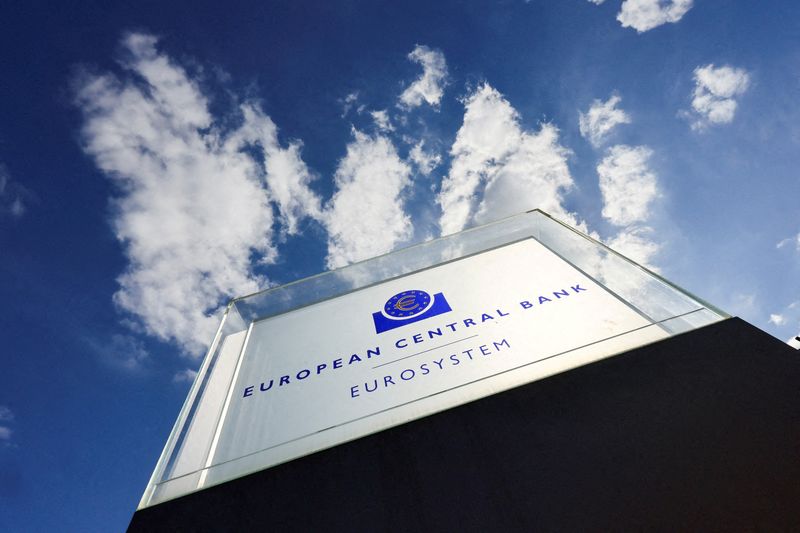By Balazs Koranyi and Francesco Canepa
FRANKFURT (Reuters) – The European Central Bank is all but certain to keep borrowing costs at a record high on Thursday but is likely to signal that a rate cut could come as soon as June, given a sharp slowdown in inflation and continued economic weakness.
The ECB has kept interest rates steady since September but has already signalled that cuts are coming into view, with policymakers awaiting a few more comforting wage indicators before pulling the trigger.
The only complication could be if the U.S. Federal Reserve delayed its own policy easing, although even that might slow but not stop the ECB given a widening gap in performance of the world’s biggest economy and the 20-country euro zone.
The currency bloc is now in its sixth straight quarter of economic stagnation and the labour market is starting to soften. Meanwhile, the U.S. economy continues to grow above trend, its labour market remains tight and inflation rose more than expected last month, raising the risk of price growth getting stuck.
“June feels like a compromise between (ECB) doves and hawks,” Deutsche Bank said in a note.
“The hawks accept that the inflation outlook has improved but don’t want to rush into easing as soon as April. The doves may be pleased the hawks are not opposing cuts and are happy to wait until June for a stronger consensus on a cut.”
Policymakers have pointed to a June cut in the 4% deposit rate so often that investors consider it an effective pre-commitment and any walking back would risk damaging the ECB’s credibility.
But ECB President Christine Lagarde is likely to avoid any talk of what happens beyond June, especially as there is little consensus yet on how far and fast interest rates need to fall.
Markets have priced in 80 basis points of cuts this year, or between three and four moves, but these expectations have moved in a wide range.
FED IN SIGHT
Fuelling rate-cut talk, consumer price inflation fell to 2.4% last month and could ease back to the ECB’s 2% target before year-end, well ahead of the bank’s own 2025 projection.
Meanwhile rapid wage growth, seen by the ECB as the single biggest inflation threat, is slowing, labour markets are softening, investment is weak and bank lending stagnant, all pointing to a further decline in price pressures.
“We think the ECB might stop slightly above neutral and we are forecasting a 2.25%-2.50% terminal rate,” Antonio Villarroya at Santander (BME:SAN) CIB said.
“As a result, the ECB would need to cut 150-175bp in slightly over three quarters. Therefore, the room for skipping/pausing looks very limited and we think a 25bp cut/meeting is the most likely scenario.”
Most others, however, see slower moves, with the ECB skipping a meeting or two – possibly July or October, when it does not publish new inflation and growth projections.
The Fed could also disrupt the ECB’s plans.
While the U.S. central bank is still keeping three rate cuts on the table for this year, markets are increasingly doubtful given the remarkable strength of the American economy and upside surprises in inflation. Cuts too close to November’s U.S. elections might also risk fuelling accusations of political interference.
The ECB insists that it sets policy independently, but prolonged divergence with the Fed, which traditionally sets the pace for the global economy, could be counterproductive.
Faster ECB rate cuts would weaken the euro and push up yields as funds flow across the Atlantic, so markets would simply undo some of the ECB’s work.
A June rate cut would pre-empt the Fed in any case but the ECB will be careful not to get too far ahead.
“Imagining policies diverging for longer is more difficult, because ultimately whatever drives decisions at the Fed will spill over to Europe and affect the euro zone as well,” Danske Bank economist Piet Haines Christiansen said.
